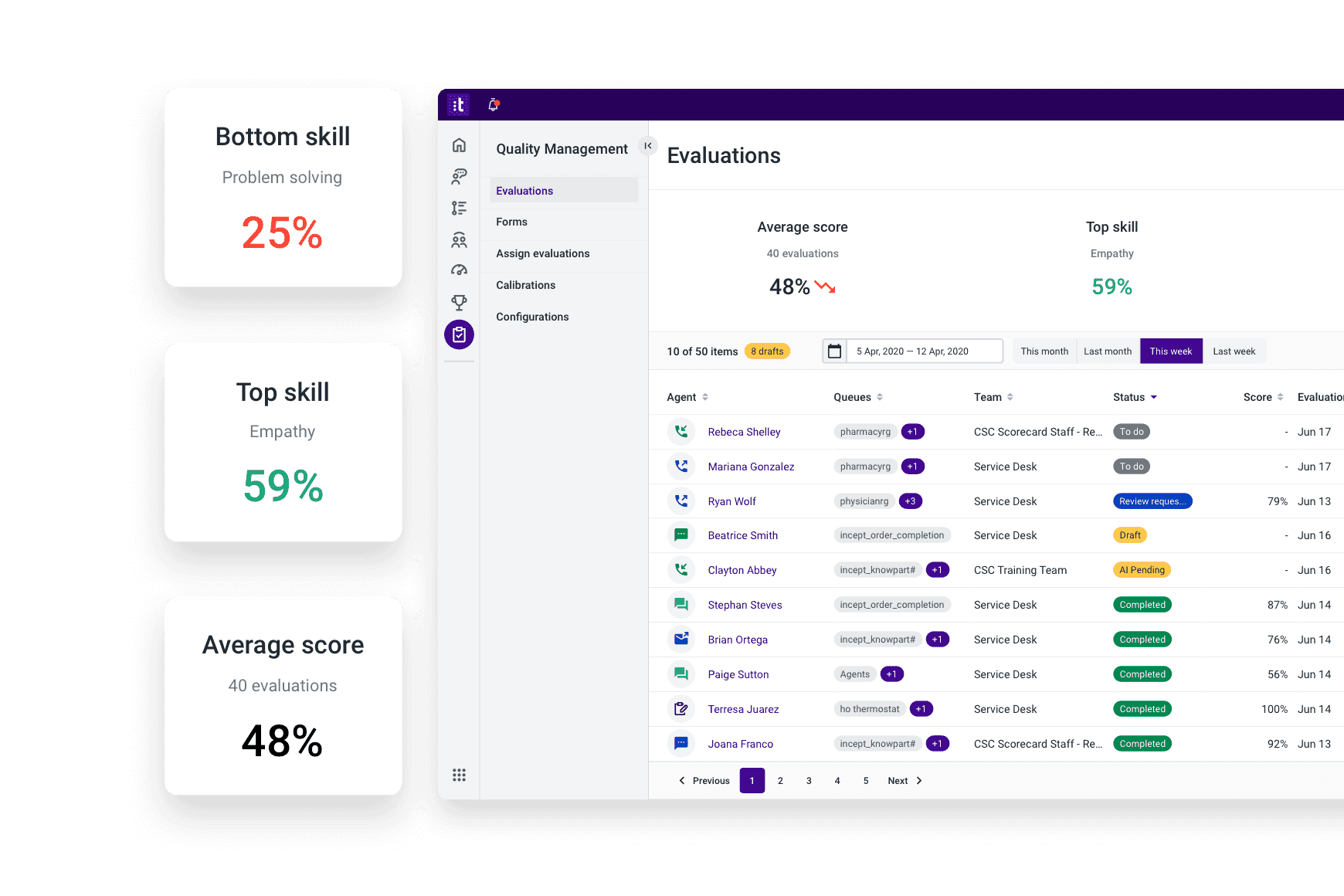A guide to contact center quality assurance

By Celia Cerdeira
0 min read

Contact center quality assurance is the backbone of consistent, high-performing customer service, ensuring every interaction meets the mark.
Modern customers demand nothing short of exceptional service, and the contact center is a crucial touchpoint in delivering memorable experiences. Yet, it can also be a ground for frustration, where even the slightest mishap can lead to negative reviews and lost revenue. A dedicated quality assurance framework that monitors, evaluates, and improves customer service can transform a contact center.
When executed effectively, contact center quality assurance can take customer satisfaction to new heights, supercharge agent performance, and elevate service delivery. Find out how contact center quality assurance tools set the stage for a transformational journey toward customer-centric service.
What is contact center quality assurance and why is it important?
Contact center quality assurance evaluates interactions to ensure they meet defined quality standards. For example, listening to calls, reading emails, and reviewing live chat transcripts to assess agent performance.
Quality assurance in the contact center helps maintain high service quality, ensures all interactions are handled professionally and effectively, and provides valuable feedback for agents, helping them improve their skills and performance. It also allows managers to identify and address any issues or trends impacting customer satisfaction and loyalty.

PRODUCT
Quality Management improves agent effectiveness.
Track individual and team performance with accessible metrics that can easily be exported into other systems. Reinforce positive behavior and reward progress through gamification and social recognition.
Benefits of contact center quality assurance.
Implementing contact center quality assurance lays the groundwork for continuous improvement, stronger customer relationships, and a more empowered workforce.
Here are just a few ways quality assurance can make a measurable impact:
-
Boosts customer satisfaction and loyalty. By monitoring and refining interactions, quality assurance ensures customers receive accurate, empathetic, and helpful support, driving long-term loyalty.
-
Enhances agent performance and engagement. Quality assurance provides actionable feedback that helps agents grow their skills, feel more confident, and stay motivated.
-
Drives consistency across interactions. Whether over phone, chat, or email, quality assurance helps maintain a consistent brand voice and service level across all channels.
-
Identifies training and coaching opportunities. Spotting patterns in agent performance enables targeted coaching, reducing repeat errors and improving efficiency.
-
Supports compliance and reduces risk. Quality assurance processes help ensure regulatory and policy adherence, protecting the business from costly errors and potential legal issues.
A data-driven approach to contact center management.
With the rise of AI agents and machine learning technologies, many organizations leverage AI-powered contact center quality management software to streamline their quality assurance processes and gain deeper insights into their operations.
AI-powered quality assurance tools can automatically evaluate interactions, pinpointing improvement areas. This provides precise, actionable feedback to help agents refine their service delivery skills and improve overall customer experience.
These tools can also identify and understand patterns in interactions, predicting trends that could impact future performance. This predictive analysis allows managers to take a proactive stance, making informed decisions to boost service quality before issues escalate.
Exploring the criteria used to evaluate contact center agents.
When evaluating contact center agents, it’s essential to define the appropriate KPIs and metrics that align with business goals. With AI-powered contact center software, you can easily track these metrics and clearly understand agent performance.
Customizing evaluation forms.
Customizing evaluation forms allows managers to focus on the specific skills and behaviors that are most relevant to the business. For example, in a tech support contact center, technical knowledge and problem-solving ability are crucial, while in a sales-oriented environment, persuasion and closing skills might be more important.
Customization also allows for a more nuanced understanding of agent performance. Instead of relying solely on broad metrics like customer satisfaction score (CSAT) or average handle time (AHT), customized evaluation forms can assess specific parts of interactions. This could include the agent’s empathy with customers, adherence to scripts, or effectiveness in upselling or cross-selling products.
Interaction criteria.
Evaluate not just what agents say, but how they say it. This includes their tone of voice, capacity to listen and understand customer needs, and ability to communicate clearly and effectively.
Problem-solving is another critical agent skill. Agents should be able to diagnose customer issues and provide effective solutions quickly. They should have a deep understanding of the company’s products or services to provide accurate information and advice to customers. Regular interaction monitoring and scoring help identify areas for improvement and ensure consistent service quality.
Compliance and ethical standards.
Compliance with regulatory standards and ethical norms is another non-negotiable. Agents must comply with all relevant data privacy laws and regulations and company policies regarding customer information. This includes obtaining necessary permissions before recording calls and maintaining confidentiality.
Ethical standards also play a vital role in agent evaluation. This could include their honesty and integrity in dealing with customers, respect for cultural and individual differences, and commitment to providing fair and equitable service. Regular training and reinforcement of these standards can ensure they are consistently upheld across the contact center.
Essential metrics managers should look at for success.
When managing a contact center, it’s crucial to keep an eye on key metrics that reflect the efficiency and effectiveness of operations.
First contact resolution (FCR).
First contact resolution (FCR) measures the percentage of interactions resolved during the first contact. A high FCR rate is often an indicator of effective problem-solving and efficient service delivery. It suggests that agents have the knowledge and resources to handle customer issues promptly.
Customer satisfaction score (CSAT).
Customer satisfaction score (CSAT) measures how satisfied customers are with a service. Regular CSAT surveys are a great way to assess this, but digging deeper into the feedback received is essential. Understanding why customers are satisfied or dissatisfied provides actionable insights for improving service delivery.
Average handle time (AHT).
Average handle time (AHT) measures the average time spent handling an interaction. This metric helps assess agent efficiency and workload management. Keep in mind a lower AHT isn’t always better. If agents rush through calls to keep their AHT low, this could negatively impact service quality and customer satisfaction. Instead of focusing solely on reducing AHT, consider strategies to make each interaction more efficient. For example, Talkdesk AI-powered automatic summary uses AI to automatically summarize every customer interaction, reducing AHT by 30-60 seconds.
Customer effort score (CES).
Customer effort score (CES) measures how easy it is for customers to get their issues resolved. Unlike satisfaction surveys that capture how customers feel about an experience, CES measures how much work a customer had to put in to achieve their goal. High-effort experiences—like repeating information, getting transferred multiple times, or navigating confusing self-service options—can quickly erode trust and lead to churn.
Service level.
Service level is a foundational metric that reflects how well a contact center meets customer demand in real time. It typically measures the percentage of calls answered within a specific time threshold, like answering 80% of calls within 20 seconds, and serves as a direct indicator of responsiveness and staffing efficiency. When service levels drop, customers are left waiting, frustration rises, and the likelihood of abandoned calls increases.
Three effective contact center management strategies to help agents improve productivity.
To improve agent productivity, contact center managers should consider the following strategies:
Leveraging technology wisely.
Utilizing the right tools streamlines processes and improves efficiency. AI-powered contact center quality management software can automate routine tasks such as call recording and transcription, provide real-time feedback, and generate detailed reports and analytics. Ensure the team receives adequate training to use these tools effectively.
Embracing continuous feedback.
Creating a culture that encourages learning and continuous improvement can significantly boost productivity. This allows agents to assess their performance and identify areas for improvement continually. Additionally, it fosters a sense of ownership and responsibility, as agents are actively involved in their growth and development.
Continuous feedback shouldn’t be one-sided. Encourage agents to share their thoughts and ideas, too. Their hands-on experience with customers makes them a valuable source of insights that can help improve processes and strategies.
Agent-centric coaching.
Moving beyond monitoring to nurturing talent is crucial. An agent-centric approach to coaching focuses on individual growth and development, leading to improved performance and job satisfaction.
Start by understanding each agent’s specific skills, knowledge, and competencies. Then, design individualized coaching programs that target their specific areas of improvement. The objective is not just to improve performance, but also to foster professional growth and personal development.
Nine contact center quality assurance best practices to implement.
To effectively monitor agent performance, managers should consider the following best practices:
1. Set key performance indicators (KPIs).
Setting KPIs helps track performance against set targets. These KPIs should align with business goals and customer expectations, providing a measurable way to track progress and success. Setting KPIs can ensure the team is focused on achieving key objectives and delivering high-quality service.
2. Use performance analytics tools.
Performance analytics tools offer a wealth of information about individual and team performance. They can help identify trends, track progress against goals, and inform strategic decisions so managers can comprehensively understand their team’s performance and identify opportunities for improvement.
3. Review omnichannel data for a full perspective on agent performance.
Customer journeys rarely stick to one channel—someone might start in chat, move to email, and escalate to a call. Evaluating agent performance in silos misses the full picture. Omnichannel analysis reveals which issues are best handled on which channels, highlights agent strengths across formats, and enables intelligent routing for faster, more effective resolutions.
4. Implement a scoring system.
A scoring system provides a quantitative measure of agent performance. Assigning scores to interaction with customers, such as communication skills, problem resolution, and adherence to scripts, allows managers to identify top performers and those needing additional training or support.
5. Engage in call monitoring.
Call monitoring allows for direct observation. Listening in on live calls or reviewing recorded ones allows managers to identify strengths and weaknesses and provide targeted feedback and coaching. It also helps ensure agents are following company policies and customer service standards.
6. Map the customer journey.
Mapping the customer journey helps contact center agents visualize every touchpoint. It reveals pain points, gaps, and opportunities to improve the experience. With a clear map, agents can track key metrics like first call resolution (FCR) and customer effort score (CES) to optimize service at each stage. The result is fewer frustrations and more agents who understand their impact across the entire journey.
7. Provide regular feedback alongside performance reviews.
Quarterly performance reviews aren’t enough. Real growth happens through regular, timely feedback. While formal reviews focus on long-term goals, ongoing coaching helps agents improve specific skills in the moment, like de-escalation or tone. The most effective feedback is clear, actionable, and balanced, turning quality monitoring into a tool for development rather than criticism.
8. Uphold regulatory compliance.
Clear compliance protocols, including call disclosures, secure data handling, and authentication, are essential for protecting the organization and maintaining customer trust. Quality assurance programs should include regular audits to ensure agents follow required procedures. With solutions like Talkdesk compliance services, contact centers can meet regulatory standards without disrupting the customer experience.
9. Prioritize the customer experience.
Customer experience should be the foundation of any quality assurance program. Beyond metrics and scripts, QA must assess whether agents create positive interactions and resolve issues effectively. The most impactful programs align evaluation criteria with what customers truly value, such as speed or empathy. Prioritizing the customer experience improves satisfaction and loyalty while elevating other performance metrics.
Elevate customer experience with Talkdesk quality management software.
Talkdesk Quality Management software leverages AI to enhance the quality assurance process. It offers:
-
Automated scoring to allow teams to focus on what truly matters—delivering excellent customer service.
-
Contextualized feedback—give specific examples by adding time-stamped comments and reactions to interaction recordings.
-
Voice and screen recording of agent screens and audio simultaneously for a complete picture of every interaction.
Effective contact center quality assurance and management are crucial for delivering high-quality customer service. You can significantly enhance a contact center’s performance and customer satisfaction with the right strategies, tools, and practices. See how Talkdesk QM Assist makes it simple to evaluate agent interactions and give agents the feedback they need to provide exceptional CX. Request a demo today.
Contact center quality assurance FAQs.
Check out these common contact center quality assurance questions and answers.
Contact center quality assurance is the monitoring and evaluation of interactions and performance to ensure consistent, seamless service. It can include a variety of streams to monitor, from call handling to performance feedback.
The best criteria for evaluating agent performance will depend on the metrics a contact center has prioritized. Generally, the best evaluation criteria combine customer satisfaction metrics, like CSAT, with high operational standards, like product knowledge or process following.
Managers should consider measuring customer-focused metrics to grade the overall efficiency of a contact center. Analyze data around average handle time (AHT), first-contact resolution rate (FCR), and customer satisfaction scores (CSAT). Additional metrics include transfer rates, adherence to schedule, and quality evaluation scores for agent performance.
A continuous improvement strategy through feedback and coaching can drive agents to be more successful and productive. Investing in agent development, streamlining processes through automation, and fostering a positive work culture can also significantly boost productivity.
AI can automatically analyze interactions across channels, identifying trends human reviewers might miss. It enables real-time agent guidance during calls and provides objective performance insights while freeing QA specialists to focus on more complex tasks.
Dedicated QA specialists may be the staff responsible for monitoring performance, but it’s everyone’s responsibility to uphold quality assurance at a contact center. Agents, managers, and other staff should all work together to ensure a culture of continuous improvement in pursuit of quality.





